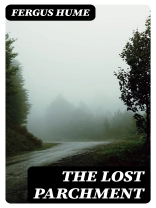In ‘The Lost Parchment, ‘ Fergus Hume expertly weaves a complex narrative that blends elements of mystery and adventure with a rich exploration of human character. Set against a backdrop of Victorian England, the novel follows protagonist Arthur Ainsworth as he embarks on a quest to uncover a hidden manuscript that holds the key to untold literary treasures. Hume’s adept use of gothic elements and suspenseful prose not only captivates but also critiques the societal norms of his time, reflecting the tension between rationality and the supernatural. The novel’s intricate plot and well-drawn characters invite readers to ponder the relationship between ambition and morality. Fergus Hume, an esteemed author of detective fiction, rose to fame in the late 19th century with ‘The Mystery of a Hansom Cab.’ His own experiences as an outsider in Victorian society—a period characterized by strict social stratification—likely influenced his portrayal of multifaceted characters navigating moral dilemmas. His ability to encapsulate the nuances of human interaction in a world governed by secrets makes ‘The Lost Parchment’ a remarkable addition to his oeuvre. Recommended for fans of classic detective stories and literary enthusiasts alike, ‘The Lost Parchment’ is a testament to Hume’s narrative artistry. This novel not only entertains with its thrilling plot but also engages readers in deeper discussions surrounding authenticity, ambition, and the intrinsic value of literature.
Giới thiệu về tác giả
Fergusson Wright Hume, known professionally as Fergus Hume, was an English novelist renowned for his contribution to the mystery and detective fiction genre. Born on July 8, 1859, in England, Hume emigrated to New Zealand with his family as a teenager and later moved to Melbourne, Australia, where he was admitted to the bar. However, despite his legal background, his passion for writing prevailed. Driven by the immense success of novels like ‘The Mystery of a Hansom Cab’ (1886), which outsold ‘Sherlock Holmes’ stories at the time and has been credited with inspiring the greater proliferation of detective fiction, Hume dedicated his career to writing. His oeuvre includes over 130 novels featuring intricate plots and emphasizing the detailed work of detectives – a novelty at the time of their publication. ‘The Lost Parchment’ (1894) is just one of many in which Hume’s talents as a master of the literary puzzle come to fore. Like many of his works, it showcases the influence of Wilkie Collins and the sensation novel movement, which was marked by domestic crime, professional detectives, and a melodramatic flair. Hume’s intricate narratives and clever resolutions have earned him a distinctive place in the annals of crime fiction, influencing the genre to this day. He died on July 12, 1932, in England, leaving behind a prolific legacy that continues to entertain and intrigue readers worldwide.












